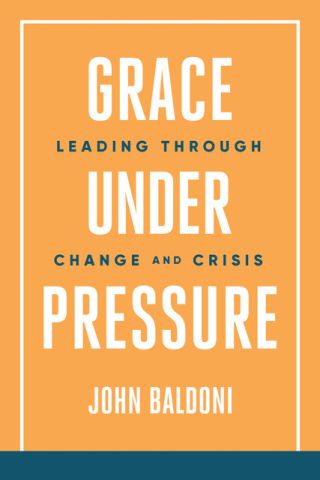Leadership
Take Care of Your People
A review of "Grace Under Pressure."
Posted November 17, 2023 Reviewed by Tyler Woods
Key points
- Leadership must be learned and earned.
- Grace is a virtue that embodies generosity, respect, humility, forgiveness, and courage.
- Grace facilitates change, which none of us want to do.
- Dire circumstances open the door for leadership.
Dire circumstances open the door for leadership. Examples include moments in war or the threat of war; oppression; natural disasters; exploration and innovation; failing businesses, non-profit organizations, government agencies, and hospitals.

Leaders who can seize that momentary opening are not born, nor are they crowned. Leadership must be learned and then earned.
Enter Grace Under Pressure: Leading Through Change and Crisis (2023), John Baldoni’s most recent book, the third of his trilogy of books about grace, a virtue that embodies generosity, respect, humility, forgiveness, and courage—humor also helps. Baldoni has authored 15 books on leadership.
Grace is the water of change, warm to our bodies and souls. Grace facilitates our proceeding with change, which none of us want to do, even when it is the only effective route out of crisis. If grace were a popular beverage, our world could be vastly different, far more disposed to light than darkness, and far kinder.
But grace is not enough, as Baldoni heralds in the title of this book. Unless we—personally and organizationally—learn how to swim in that graced water, we will all drown.
In Grace Under Pressure, his latest book, he takes us through and beyond the fundamental elements of leadership, especially in times of crisis.
First and foremost of his lessons is to take care of your people. Strive to make them a community with a common purpose. Invite and listen to their ideas, learn how to craft clear organizational goals for them, not only for your bosses or investors, and be responsive to change yourself so your people can witness flexibility in action. Leave the C-suite to spend time with your people, the engines of your organization. Admittedly, it is hard to do if you have 150,000 employees, but it is still possible to strive to make them a community by virtually broaching geographic expanses. Don’t go it alone when you have a legion of people depending on you for their livelihood and their ability to contribute to the common good.
You can’t take care of your people if you are running on empty. So, second, take care of yourself. Doing so can help you retain your focus, pivot when needed, sustain your resolve, and “…slow down to speed up.” Know your blind spots. Welcome personal change in your habits and relationships because nothing is static. The recipe for healthy safe-care is well known, but takes as much determination as you are bringing to the office: supportive relationships; attending to your body with less junk food and a more nutritious diet; exercise (the single most effective way to care for your body and mind); mind-body activities like meditation and yoga; and music, dance, reading, writing, or whatever transports your mind to where aches and pains fade, time disappears, and you feel energized, no longer depleted.
Third, create an organizational plan for the predictable future and a method for how to take action when the unexpected happens. Create a work community that can beat the odds and achieve lasting change. Recognize that how things are, the status quo, is malleable, even if sometimes needing to be hammered into a new normal. Don’t listen to the joke, “If you want God to laugh, tell her/him you have a plan.” Seek what Baldoni borrows from Winston Churchill, who led Great Britain through the darkness of World War II, when all seemed doomed, before the Americans joined the war: make grace under pressure your “finest hour.”
Fourth is when he has us return to grace. He adds on other ineffables, including wisdom and hope, which are not as elusive as you may think because you know when they are there inside you, and when offered by others. Baldoni asks us to be illuminated by Desmond Tutu’s observation that “Hope is seeing there is light despite the darkness.”
Every chapter in this book is studded with quotes that wonderfully embellish every message Baldoni provides us. What I found astounding about Grace Under Pressure was its clarity, brevity, and humanity, terms I borrow from another great teacher (of countless writers, including me), William Zinnser. Baldoni’s master class is one to enroll in for its remarkably rich and wise content, delivered with his keen prose and his grace.


